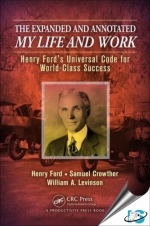Henry Ford's industrial innovations were directly responsible for the transformation of the United States into the most productive, affluent, and powerful nation on Earth. My Life and Work describes exactly how Ford did this in terms of not only manufacturing science, but also economics and organizational behavior. This holistic approach, and its validation by world-class results, make Ford's original work the best business leadership book ever written. The Expanded and Annotated My Life and Work: Henry Ford's Universal Code for World-Class Success updates this original with modern perspectives that explain and organize Ford’s thought process explicitly.
My Life and Work is not a mechanistic or industry-specific formula that practitioners can follow like work instructions in a factory, but rather a holistic synergy of impartial laws of economics, science, and human behavior—a synergy that Ford called the universal code. This universal code simultaneously delivered high profits, high wages, and low prices in every industry to which Ford applied it. It also realized unprecedented improvements in industries ranging from coal mines to railroads, and even healthcare as practiced in the Henry and Clara Ford Hospital.
This annotated edition introduces Ford’s universal code along with vital economic, behavioral, Lean manufacturing, and customer service principles. It contains almost all the material of the original, plus more than 30 percent new content that reinforces Ford’s timeless principles.
Readers who understand and internalize Ford’s universal code can easily overcome the self-limiting paradigms that afflict today’s organizations. These include, for example, the belief that healthcare is a zero-sum game in which escalating costs are the price of quality. The book illustrates the basic elements of what is now called the Toyota Production System as well as the organizational and human relations principles needed to gain buy-in and engagement from all participants.
Preface
Editors Introduction
Henry Ford's Introduction
Chapter 1 : The Beginning of Business
-
Fords Inspiration : The Steam-Powered Road Engine
-
Clocks : The Inspiration for the Synchronized Moving Assembly Line
-
Ford on Nyet Engineers and Other Wet Blankets
-
Materials Selection in Design for Manufacturing
Chapter 2 : What I Learned about Business
-
Overcome Paradigms to Achieve Results
-
Customer Satisfaction is a Key Selling Point
-
Stocks and Bonds are Dangerous Business Illusions
-
The Role of Reliability in Customer Satisfaction
-
Continuous Improvement (Kaizen)
-
A Cost Accounting System is Not a Suicide Pact
Chapter 3 : Starting the Real Business
-
Charge the Lowest Price Possible, and Not What the Market Will Bear
-
Ford and Auto Racing
-
Role of Supply Chain Management
-
Recognition of Customer Requirements
-
The Selden Patent Suit
Chapter 4 : The Secret of Manufacturing and Serving
-
Material Selection and Design for Reliability (DFR)
-
Standardization Holds Down Costs
-
Work for Continuous Cost Reduction
Chapter 5 : Getting into Production
-
The Birth of the Assembly Line
-
Ignore the Nyet Engineers
-
Keep the Work in Continuous Motion, Avoid Batch Operations
-
Subdivide the Job to Eliminate Waste Motion
-
Automate Jobs and Reduce Material Transfer Distances
-
Fords Keynotes of Production
Chapter 6 : Machines and Men
-
Break Down Organizational Barriers
-
Fords Hiring Practices
-
The Need for Continual Improvement
-
Do Not Allow the Cost Accounting System to Run the Factory
-
Pay Attention to Even Small Savings
Chapter 7 : The Terror of the Machine
-
Characteristics of the Ideal Industrial Leader
-
Repetitive Motion Injury and Job Rotation
-
Employment of Disabled Workers
-
Rules and Regulations
-
Reduce Material Transportation Distances
-
Key Safety Principles
Chapter 8 : Wages
-
Capital and Labor are Partners, not Adversaries
-
The Role of Wages in National Prosperity
Chapter 9 : Why Not Always Have Good Business?
-
Seasonal Industries
-
Economic Depressions
-
What is the "Industrial Idea"?
Chapter 10 : How Cheaply Can Things Be Made?
-
Speculation and Bubbles
-
How to Achieve Zero Inventory
-
Benchmarking
-
Use Lower Prices to Drive Lower Costs
-
Fancy Office Buildings are Evidence of Waste
-
Standardization and Cost Reduction
-
Identify and Eliminate Waste
-
Find a Use for Everything
-
How to Lose the Luddites
-
Take Profits Out of Waste, Not Employees of Customers
Chapter 11 : Money and Goods
-
Finance Begins in the Shop and Not the Bank
-
Beware of Complacency
-
Seek Continuous Price Reductions
-
Dysfunctional Effects of a Focus on Dividends
Chapter 12 : Money : Master or Servant?
-
"Housecleaning" Does not Mean Layoffs
-
Transportation and Cycle Time
-
The Role of the National Financial System
Chapter 13 : Why Be Poor?
-
Put the Job First and Money Second
-
Hoarding as a Form of Waste
-
Seasonal Work and Cyclical Industries
-
The Obsolescence of the City
-
The Role of Energy in Wealth Creation
-
The Proper Role of Capital
Chapter 14 : The Tractor and Power Farming
-
The Development of the Tractor
-
The Mechanization of Agriculture
Chapter 15 : Why Charity?
-
Industry Can Make Charity Unnecessary
-
The Henry Ford Trade School
-
The Henry and Clara Ford Hospital
-
No Free Lunch
-
The Role of Self-Reliance
Chapter 16 : The Railroads
-
How Ford Turned DT&I Around
Chapter 17 : Things in General
-
Manufacturing an End to War
-
The Danger of Propaganda
-
International Prosperity Promotes Peace
-
Education Must Be Practical
Chapter 18 : Democracy and Industry
-
The Fallacies of Class Warface
-
Labor Unrest and Strikes Should Be Unnecessary
-
The Employer and the Mandate of Heaven
Chapter 19 : What We May Expect
-
Prosperity Should be within Everybody's Reach
-
Look for Multiple Product Uses
-
The Role of the Individual in the Advancement of Industry
-
Standardization as the Servant and Not the Master
-
The Need for Sustainable Manufacturing
Conclusion
References
Index

























